Alresford Industrial School / Primitive Methodist Orphan Home, Old Alresford, Hampshire
On May 5th, 1868 the Alresford Industrial School for Girls was certified to operate in premises at Old Alresford, Hampshire. The school owed its existence to Miss Arabella Onslow of Upton House, Old Alresford who, together with her sister Arabella, not only financed the construction of the building but also took the principal part in the management of the institution. The school could accommodate around forty girls who were trained in needlework and laundry work, in preparation for future employment in domestic service. Staff at the school were a matron, schoolmistress, work-matron and a laundry maid.
In 1883, Matilda Onslow decided that she could no longer devote herself to the running of the school and offered it as a gift to the county of Hampshire, to be run under the direction of local magistrates. When this offer was declined, she decided to close the institution and its certificate was resigned the following year. The building was then occupied by the Alresford Orphan Home, another establishment supported by the Onslow family, and previously located in premises at New Alresford.
Following the death of Matilda Onslow in 1885, the building was acquired by the Trustees of the Primitive Methodist Church and in 1889 was re-opened as a children's home under the direction of Joseph Peck, with Alice Alsford appointed as matron. The property, by now known as Southdowns, originally consisted of a house with a school room attached and could accommodate fifteen children. The premises were gradually extended by the addition of new dormitories, a dining room and farm buildings, eventually housing up to 30 boys and 30 girls. Children from the home also started attending the nearby village school.
The location of the home is shown on the 1909 map below.
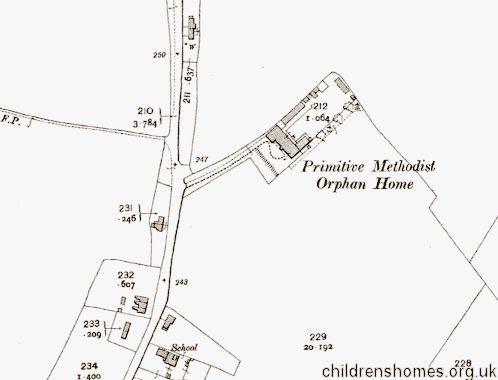
Old Alresford Primitive Methodist Home, Old Alresford, c.1909.
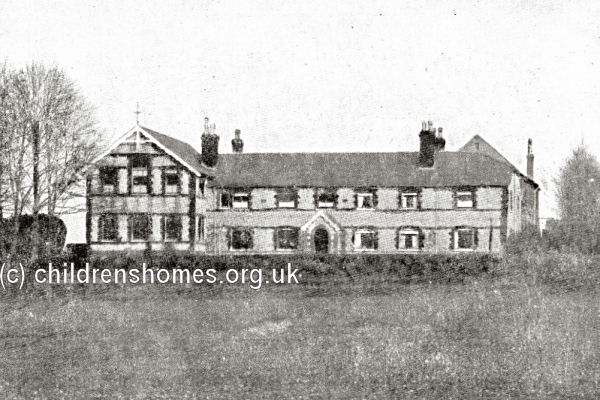
Primitive Methodist Orphan Home from the south-west, Old Alresford, early 1900s.
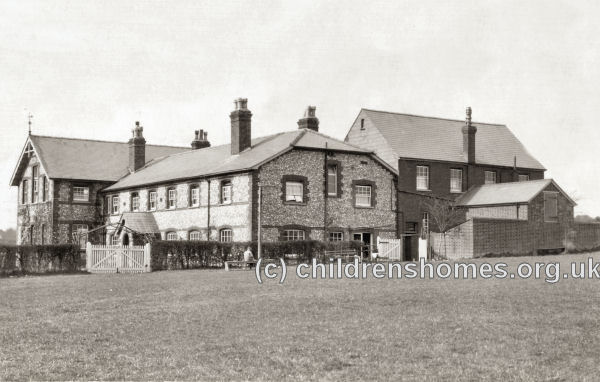
Primitive Methodist Orphan Home from the south, Old Alresford, early 1900s.
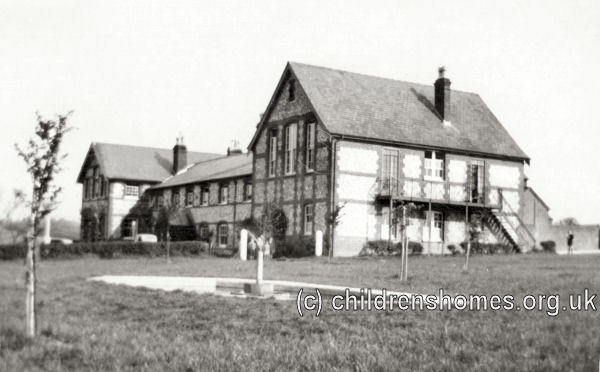
Primitive Methodist Orphan Home from the south, Old Alresford, 1920s.
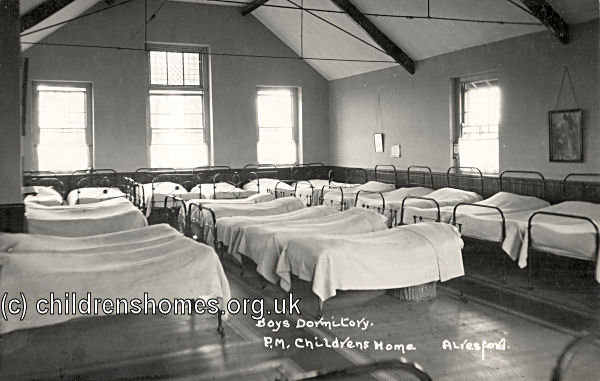
Primitive Methodist Orphan Home from the south dormitory, Old Alresford, 1920s.
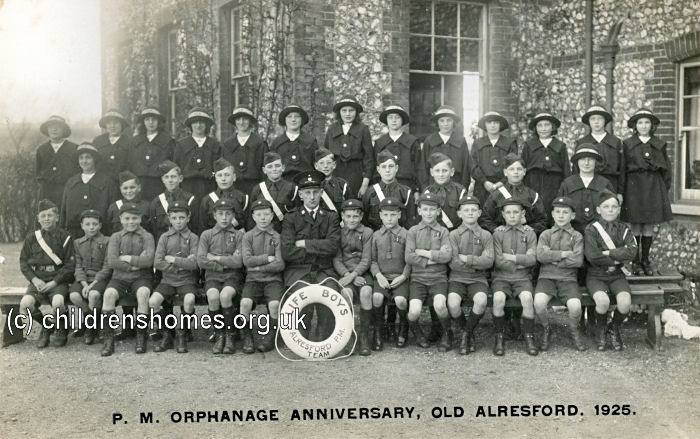
Primitive Methodist Orphan Home 40th Anniversary, Old Alresford, 1920s.
In 1932, the Primitive and the Wesleyan Methodists united to form the Methodist Church and the home was then taken over by the National Children's Home (NCH), previously a Wesleyan organisation. The same happened to the home's sister establishment at Harrogate in Yorkshire which took children from the north of England.
During the Second World War, children from the NCH home at Alverstoke were evacuated to Old Alresford with the number of children at the home rising to 74.
After the war, in succession to his parents, Mr E.J. Alsford was appointed Superintendent of the home with his wife as Matron. The segregation of boys and girls that had been in operation then ended and the children housed in family-style groups.
Accommodation at Southdowns was expanded in 1961 with the opening in its grounds of Mary Yolland House. The building was named after the woman who in 1909 had founded a home for incurable children at Farnham which the NCH had taken over after her death in 1955. Having decided that more modern premises were required, the Farnham home was sold off and the proceeds used to fund the new house at Southdowns.
In 1979, Southdowns was converted for use as a Community Home for 28 young people in local authority care. It finally closed in around 1995 and has now been converted to residential use.
Records
Note: many repositories impose a closure period of up to 100 years for records identifying individuals. Before travelling a long distance, always check that the records you want to consult will be available.
- Action For Children (formerly the National Children's Home). Can provide access to their own records for individuals who were adopted through the charity or who resided in one of its homes. Help also for those searching for family history information.
Bibliography
- Bradfield, William The Life of the Reverend Thomas Bowman Stephenson (1913, Kelly)
- Curnock, Nehemiah The Story of the Children's Home (C.H. Kelly, 1901)
- Higginbotham, Peter Children's Homes: A History of Institutional Care for Britain's Young (2017, Pen & Sword)
- Horner, Francis Shadow and Sun (Epworth Press, 1920)
- Howard, Philip J Philip: a Strange Child (Dalkeith Publishing, 2007)
- Philpot, Terry Action For Children (Lion, 1994)
- Walpole, Cecil F. Golden Links (Epworth Press, 1941)
Links
- Action For Children.
- Their History — a website on the homes by a former resident.
- Growing up in the NCH — a forum for those who spent time in NCH homes.
Films
- Scenes from various NCH Homes — 1960s film footage.
- NCH Documentary (1954) Part 1 — Arriving at Harpenden.
- NCH Documentary (1954) Part 2 — Harpenden Oval.
- NCH Documentary (1954) Part 3 — Annual Convocation, Alverstoke
- NCH Documentary (1954) Part 4 — Special facilities at Danesford, Chipping Norton, Harpenden and Frodsham.
- NCH Documentary (1954) Part 5 — Founders Day at Princess Alice Orphanage; training at Harpenden.
- NCH Documentary (1954) Part 6 — Harpenden.
- NCH Documentray (1964) Part 1 — Disabled and special needs at Harpenden and Chipping Norton
- NCH Documentary (1964) Part 2 — Disabled and special needs children at Harpenden, Edgworth, Chipping Norton.
- NCH Documentary (1964) Part 3 — Harpenden, Edgworth, Chipping Norton.
- NCH Documentary (1964) Part 4 — Alverstoke.
- NCH Documentary (1964) Part 5 — Alverstoke.
- NCH Documentary (1964) Part 6 — Alverstoke.
- NCH Frodsham (1960s) Part 1
- NCH Frodsham (1960s) Part 2
- NCH Brackley (1960s)
- Danesford School (1960s)
Except where indicated, this page () © Peter Higginbotham. Contents may not be reproduced without permission.


